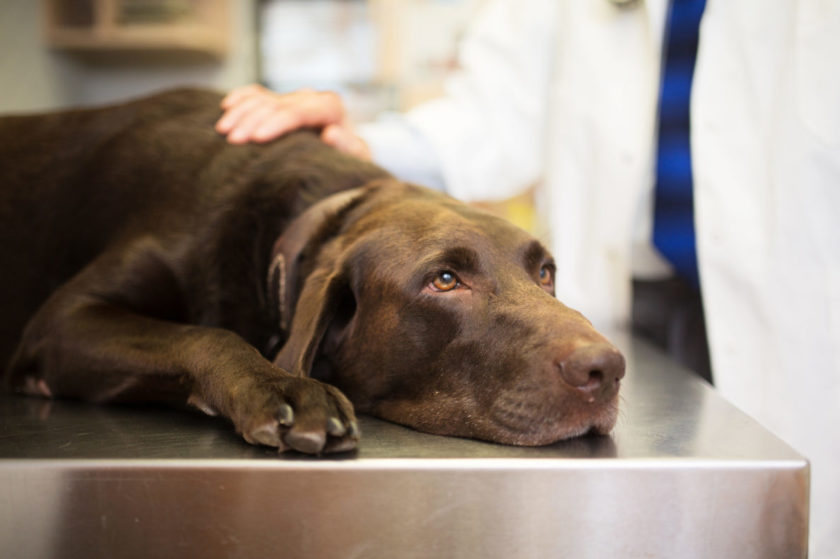It's important for pet owners to know the signs of heartworm in dogs. A veterinarian explains what to look for, and how to prevent heartworm in the first place.
With all the time they spend outside, dogs are susceptible to all kinds of bugs, infections, and diseases. Most pet owners know the importance of flea and tick prevention, but there's another parasite you need to look out for: heartworms. Unlike with fleas and ticks, heartworms aren't visible to the naked eye—making them difficult to detect and even more dangerous. Heartworm disease is prevalent in various animals across the United States and can be deadly for your pup, especially if it is not treated quickly. However, it is completely preventable with monthly medication. We asked a veterinarian everything dog owners need to know about heartworm, including what heartworm disease is, the signs of heartworm in dogs, and how to prevent heartworm in the first place.
What is Heartworm Disease?

Heartworms are spread through the bite of a mosquito. The infected mosquito transfers a parasitic worm known as Dirofilaria immitis. The spread of heartworms happens when a mosquito bites an animal infected by adult female heartworms who have reproduced microfilariae or baby worms. The mosquito picks up the infective larvae and transfers them onto the next animal it bites—usually a dog, cat, or ferret. The heartworm larvae then travel from the mosquito bite on the surface of the animal's skin into their bloodstream, where it takes about six months for them to mature into adult heartworms and reproduce. After that, the worms make themselves at home in the dog's heart, lungs, and blood vessels.
According to the American Heartworm Society, dogs are the preferred host for heartworms. They will gladly set up shop in the arteries and grow into adult worms, which will mate and multiply rapidly. They can live in their natural hosts for up to seven years. However, untreated adult heartworms can cause serious damage and ongoing health issues in dogs.
Signs of Heartworm in Dogs

RELATED: "Head Pressing" in Dogs: Knowing The Signs Can Save a Life
It's important to recognize the signs of heartworm in dogs, because it can be deadly when left untreated. Heartworm symptoms can vary depending on the stage of infection. In the early stages, also known as a Class I infection, the signs of heartworm in dogs may be very mild or non-existent. However, as the infection progresses, so do the symptoms of heartworm disease. According to the Food & Drug Administration, dogs who progress to Classes II and III will begin to show more severe symptoms.
Dr. Alex Schechter, a veterinarian at Pure Paws Veterinary Care, tells WideOpenPets.com that dog owners should look for signs of heartworm such as:
- Shortness of breath
- Persistent cough
- Excessive panting
- Intolerance of exercise
- Sluggishness or lethargy
- Weight loss
- Bulging belly due to fluid accumulation in the abdomen
- Nose bleeds
- Pale gums
- Bloody or coffee color urine
"In the worst-case scenario, your pet may die suddenly," Schechter warns. "You may not see all these signs in your pet; sometimes, an infected pet may have no symptoms or may develop these signs at any time."
Still, it is possible for dogs to recover completely from heartworm. The heartworm prognosis in dogs depends on factors like age, health history, and most importantly, the stage at which the infection was detected.
Can Heartworm Disease in Dogs Be Cured?

If your pup tests positive for heartworms, there are heartworm treatment options available.
"The disease can be cured with treatment such as adulticide therapy," Schechter explains. "Vets use Melarsomine dihydrochloride in three injections."
This FDA-approved drug is injected into the dog's back muscles and typically only works on early classes of heartworm infections. Other treatment options include the prescription of antibiotics, antihistamines, and glucocorticosteroids. Exercise restriction is also common, and the level of restriction is more stringent based on the disease severity. A worm buildup in your dog's cardiovascular system is called caval syndrome or a Class IV infection. Infected dogs have little chance of survival once they reach this stage, as irreparable damage may be done to their organs. Dogs with Class IV may require the surgical extraction of adult heartworms, but not all surgeries are successful.
How to Prevent Heartworm in Dogs

The best way to keep your dog safe from heartworm infection is by preventing it in the first place. Pet owners can combat the disease with one of several heartworm preventatives. Monthly chewables or tablets such as Heartgard, Interceptor, Sentinel, and Simparica Trio have all been proven to effectively prevent heartworm in dogs. Another option is an injectable called ProHeart 12, an FDA-approved drug that prevents heartworm disease in dogs for one full year with just one shot administered by a vet. There are also topical heartworm prevention options available. Regardless of which heartworm preventative medication you choose, both the FDA and the American Heartworm Society agree that year-round prevention is the best way to keep your dog healthy. Also, be sure have your dog screened annually for heartworm with blood tests given by a vet prior to administering medication.
What heartworm prevention do you use? Tell us on our Wide Open Pets Facebook page.




